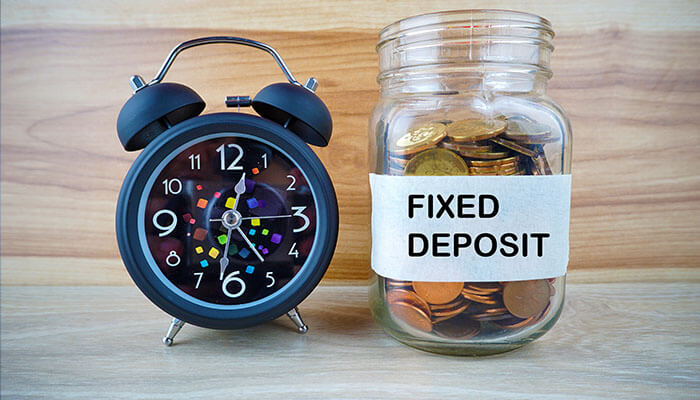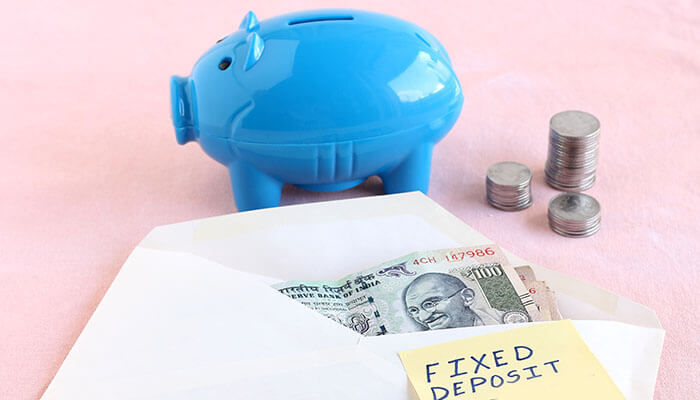A fixed deposit (FD) is one of the most widely used investment vehicles in India. It offers guaranteed returns on the invested amount, along with interest. You can invest in an FD through banks or non-banking financial corporations (NBFCs). They offer better interest rates than a savings account.
However, before making any financial investment, you must properly understand their terms and conditions. This article will discuss what you should consider before investing in a fixed deposit account.
8 Things to Know Before Investing in a Fixed Deposit Account
With a proper strategy, you can use fixed deposits as an efficient savings tool while receiving a decent return on interest.
However, before you make any investment decision, it would help if you knew some important points about FD investments.
1. Minimum Investment Amount
Fixed deposits are one of the few investment schemes that do not require a huge initial investment amount. In fact, the minimum amount is not specified. Therefore, it varies depending on the financial institution you choose.
However, in general, the minimum deposit amount could go as low as Rs. 1000, offered by top providers. Therefore, if you are looking for smaller initial investment options, you can explore FD schemes offered by various banks and NBFCs.
2. Fixed Deposit Laddering Strategy
Laddering is an effective strategy that can help you maximize your returns from fixed deposit schemes. In the present state of inflation, banks are often found to revise their interest rates upward. Therefore, you can spread your investments into multiple FD accounts that offer different interest rates with different maturity periods. By doing so, you will have multiple FD accounts maturing at different periods and, therefore, constant liquidity of funds. Moreover, it saves you from breaking your FDs prematurely during an emergency.
Moreover, you can reinvest the returns received from the shortest tenure at the right time at a higher rate.
3. Explore Your Options in Corporate Fixed Deposits
In addition to reputable banks, there are also small finance banks and some NBFCs that generally offer a much better rate of interest on FDs. It is often termed a corporate fixed deposit.
The main benefit of investing in a corporate FD is that it generally offers a much higher rate of interest than traditional banks. Furthermore, the penalty for prematurely breaking the FD is very low.
Though the minimum penalty period as per RBI guidelines is three months, in most banking institutions, the penalty period is throughout the plan’s tenure. But with corporate FDs, you can enjoy a shorter penalty period.
However, before you invest, you must compare offers from different institutions to get the best deal.
4. Effective Returns May be Low
Fixed deposit accounts guarantee safe and secured returns due to interest rates that are higher than the standard savings account. However, note that the interest you earn from an FD account will be added to your taxable income.
Therefore, you will have a smaller amount of post-tax returns if you are in the top tax bracket, paying 30% income tax. FD falls under the “income from other sources” bracket and is taxed.
Most financial institutes offer approximately 6.5%–7% interest rates on average. So, the money you will receive after all the necessary deductions may be negligible. Hence, it would be best if you estimated your returns before investing. Furthermore, FDs may offer a far better value for preserving your capital than as a wealth creation tool.
5. Special Fixed Deposit Schemes
Financial institutions, especially banks, offer special fixed deposit schemes at different times of the year. These have specific maturity periods like 444 days, 650 days, or 888 days but have a higher rate of interest compared to the standard schemes.
In this regard, you may want to consider such schemes if you come across them since they can offer you a higher return with a few days more on the tenure.
6. Availability of Loan Against Fixed Deposit Account
Fixed deposit investments also offer loans against your deposits in an emergency or urgent need. This scheme is also available for corporate FD. Here, you can secure a loan by pledging your fixed deposit.
However, the loan amount depends on your deposit. Generally, it may be up to 90–95% of the FD amount and come with a lower interest rate. By availing of this option, you can continue to enjoy the FD interest rate without having to prematurely withdraw your fund and pay the penalty.
7. Sweep-in Fixed Deposit
Before you invest in a fixed deposit, look for providers that offer a sweep-in facility. By doing this, you can transfer your surplus income or extra cash to the fixed deposit. It can help you get a higher return on your investment while maintaining liquidity.
8. Mode of Payment of FD Interests
Lastly, with a fixed deposit, you will have flexibility in the interest payout. There are two options, namely cumulative and non-cumulative payouts. In the first one, you can receive the earnings as a lump sum at the end of the maturity period. While in the non-cumulative option, you can select a monthly, quarterly, bi-annual, or annual payment at your convenience.
Finally, having a fixed deposit account is one of the most secure savings-cum-investment options that offer capital preservation with interest earnings.
However, the interest you earn will be subjected to a tax deduction. Hence, you must invest carefully while taking the above-discussed points into account. Moreover, using sweep-in and laddering strategies, FDs can be a useful investment tool for bringing diversification to your portfolio.




